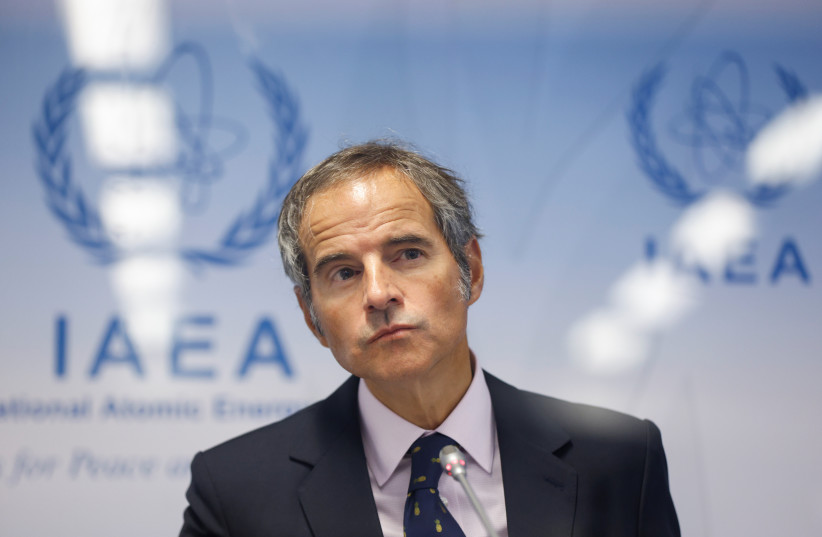The Saturday deal between the IAEA and Iran was likely a turning point which will reshape the nuclear issue for years to come.
On its face, it was a mere technical agreement for the Islamic Republic to provide some additional technical answers about three illicit nuclear sites and illicit nuclear material between now and June.
However, the new tone effused by both Tehran and IAEA Director-General Rafael Grossi made it clear that it was so much more than that.
Simply put, this deal would not be happening if the 2015 JCPOA nuclear deal was not being renewed in the very near future, and it is happening because the new Iran nuclear arrangement is as close to being signed as it has ever been.
Both sides seem dedicated to closing the IAEA probes by June.

Grossi tried to downplay the concessions his agency is making to the ayatollahs in resolving his probe into what appear to be concealed military aspects of the program or at least covered-up aspects.
But follow-up questions from reporters at a press conference fleshed out that he is giving up on investigating an illicit uranium metal disc which was discovered by the Mossad in January 2018 because he feels there is no way to get more answers.
He did not fully explain why he is dropping that issue at a fourth nuclear site, while continuing to seek answers at three other nuclear sites. But, part of the answer seemed to be an acknowledgment that there were too many easy ways for Iran to cover it up.
The metal disc in question had a history going back 20 years and was connected to a site where it could have had some reason for being where it was found. Or simply, it would not be inexcusable for the Islamic Republic to have melted it down into something else.
In contrast, Grossi said that there was no reasonable explanation possible for finding uranium traces at the other three sites.
So for those sites he would continue to demand answers from the ayatollahs.
Or if he has set June as the deadline for resolving the issue, and all hints are that he will then close or mostly close the probes, are we returning to a trend where the IAEA is ready to accept almost any explanation – however far-fetched – as long as it is theoretically possible?
This would match up neatly with signing a new JCPOA deal later this week which would be implemented over three months – also wrapping up in June.
Grossi said the two processes – the IAEA negotiations and the world powers in Vienna negotiations – are separate. Yet, it seems hardly coincidental that they will likely have new deals signed the same week and conclude implementation around the same time, three months down the line.
Incidentally, this is close to identical to what happened around the time of the JCPOA in 2015.
Suddenly, bizarre answers to serious questions about Iran’s nuclear past which the IAEA would have laughed out of town at an earlier date, became acceptable to facilitate the broader deal and a stable inspection regime.
The past no longer mattered, only the future.
Forget the fact that the past contained tremendous detail about the Islamic Republic’s weapons group – a key component to developing a nuclear weapon after a country enriches sufficient uranium.
Going forward, this would mean forgetting much of what the Mossad found in 2018, three years after the JCPOA. True, much of what the spy agency found related to the 1999-2003 period, but it still related directly to the weapons group making five nuclear bombs – pretty important issues to resolve.
Remember, if a new JCPOA is restored, Grossi gets his agency’s access renewed for a variety of inspection activities and finally gets to see its own video footage dating back a year and which Iran has blocked access to.
This is his incentive to forget the past.
It will leave Israel the main party to continue to search for answers about the weapons group.
Meanwhile, Russia’s bluff about upsetting the applecart over Ukraine was not meaningless, but is not expected to get much traction.
The US quickly shot down the threat of connecting the two issues and it was pretty obvious from the start that Washington would not harm Russia’s trade with Iran which is at the heart of the JCPOA.
Most likely, Tehran’s excess uranium stock, enough for two to three nuclear weapons enriched to the 90% level, is expected to be shipped off to Moscow.
Many Iranian nuclear facilities function with Russian assistance.
There was no way the Biden administration was going to jeopardize this.
Russia seemed to understand this with its IAEA Ambassador Mikhail Ulyanov emphasizing on Sunday that the IAEA visit to Tehran had been “very successful.” That is not a message you put out when you are doing all you can to sharpen your ability to undermine the deal.
But the entire incident was another opportunity for Russia to toss an issue to the US of additional potential instability going forward.
It is doubtful that Moscow would cause the impending deal to fall apart.
But what if it said that the West’s sanctions were causing shipping delays which might delay transporting the ayatollah’s uranium back to Russia?
Not a deal killer, but certainly another pressure point to exercise.
Yet, overall the clear message from this weekend was that the JCPOA is going full speed ahead and the parties are probably privately starting to fight out details relating to the signing ceremony.
